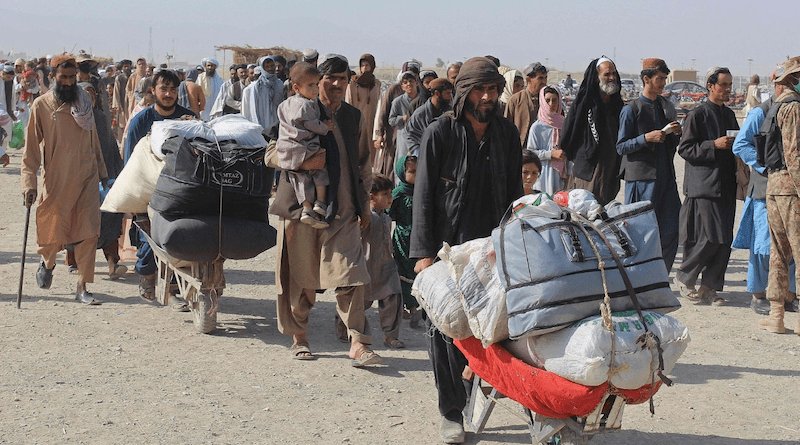Protracted Afghan Refugees Commitment: Pakistan Adopting A New Policy – OpEd
Since the Soviet Union invaded Afghanistan in 1979, Pakistan has hosted one of the largest long-term refugee populations anywhere in the world. The situation led to one of the biggest exoduses of refugees. Afghan refugees continue to flee to Pakistan as a result of the ongoing bloodshed, political unrest, and economic hardship in their home country. Pakistan coped with frequent difficulties in accommodating such a sizable migration, including infrastructure, food, security, and the economy. However, despite all the difficulties, it continues to work for both local residents and Afghan refugees. A few days ago, on the first week of February, 2023. UNCHR established a one-time payment programme with the assistance of the Pakistani government for Afghani families who have been severely affected by the recent floods of 2022.
Since 2002, nearly 3.8 million Afghans have returned to their homeland, but a significant number continue to migrate back to Pakistan. Due to dwindling donor aid, domestic restrictions, a weak economy, refugee fatigue, and the rising threat of terrorism, Afghan refugees have grown to be a significant concern for Pakistan over time. Many Afghans have been born in Pakistan over the past 30-years and have assimilated into the local culture. In addition to the fact that it has been really challenging to calculate the exact number of Afghans because of the numerous waves of refugees leaving Afghanistan and then returning. Moreover, despite the absence of official arrival statistics, the number of Afghan refugees has significantly increased since the Taliban administration came into power.
Comparing the statistics of the last couple of years, as of 2014, Pakistan was home to about 1.6 million properly registered Afghan refugees, and by the end of 2015, 1.5 million Afghans were living in Pakistan. The majority of those who fled entered Pakistan over its border and now live in cities and refugee camps and do not contact UNHCR , thus remaining unregistered. These figures keep fluctuating, as in 2021 they crossed the threshold of 3.5 million, according to government estimates, and there were only 1.4 million officially registered refugees. The United Nations High Commissioner for Refugees estimates that since the beginning of 2021, some 28,000 individuals from Afghanistan have arrived in Pakistan (UNHCR).
Even though Pakistan has approved some Afghan immigrants’ short-term transit visas, it has refused to meet the humanitarian needs of individuals who entered the country illegally. As a result, Pakistan has been the nation most susceptible to mass migration, militant activity, and drug and weapon trafficking from Afghanistan. Although the UNHCR has increased the aid package for registered Afghan refugee families choosing to return to Afghanistan from US$200 to US$400 per person, Pakistan has spent hundreds of billions of dollars over the previous 34 years sheltering Afghan refugees because of the refugees’ lack of intent to go back due to the unstable situation in Afghanistan.
Considering the severity of the terrible floods of 2022 and the prevailing ecological situation, a one-time monetary support programme for the 1.3 million Afghan refugees in Pakistan was launched on February 2 by UNHCR and the GoP. In partnership with the Government of Pakistan, the aid is being given to refugees who are not entitled to the same social protection systems as Pakistani nationals. The programme is based on the government’s emergency cash programme for flood-affected, disadvantaged Pakistani families. Rendering on family size, registered Afghan refugees may receive up to PKR 25,000. The UNHCR’s Regional Director, Mr. Indrika Ratwatte, admired Pakistan’s efforts and cherished the honour of assisting a trusted partner like Pakistan.
Regardless of its own financial problems and social pressures, Pakistan made an admirable attempt to assist the most disadvantaged Afghan people. Pakistan has protected 850,000 Afghan Citizen Card holders and refugees while upholding the greatest requirements for safety, especially during the COVID-19 pandemic. Thanks to Pakistan’s unmatched generosity, both refugees and Afghan Citizenship Card holders are eligible for free primary school enrolment, admission to significant higher education scholarships, bank accounts, and a variety of employment options. This immense humanitarian support and aid demonstrates Pakistanis’ kindness, compassion, and empathy for their Afghan neighbours and brothers. Despite being engaged in some alleged activities, the Pakistani government has over the years not only embraced the Afghani community but also given them the opportunity to develop independently, obtain an education, launch a business, and travel freely around the nation like Pakistani residents.

